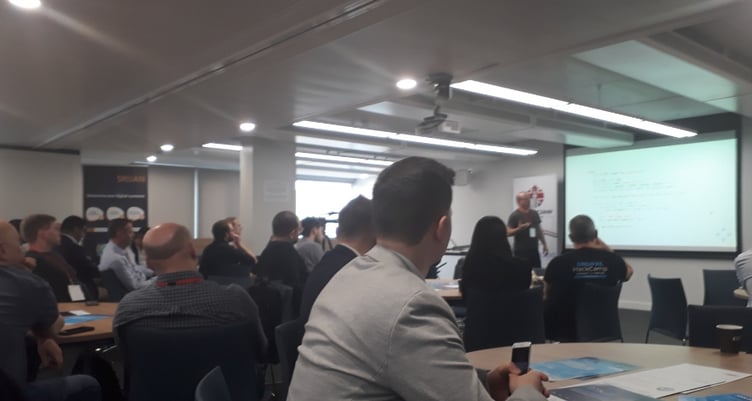On the evolution of web content approaches and technology perspectives
Change is in the air!
In more ways than one, our world is in the throes of change. We live in an era where politics and governance, economy and international relations as also business and technology are all careening through an edge-of-the-seat roller coaster ride, from one ‘cutting edge’ to another.
Ideas, values, systems, processes, frameworks - what held good yesterday is today up in the air. We see this in our lives - professional and personal. We seek the new constantly, be it a new Mar-Tech platform every few months for our businesses, or a new Soc-Med channel to post our holiday pictures on, discarding the one that was ‘trusted’ till yesterday.
Not surprisingly, this affects both organizations and individuals - the changes in our experience of institutional frameworks, business models, corporate ethics, interpersonal relationships, the way we shop, eat, dress, travel, even our experiences of climate change.
The bit about climate change brings me to my own experience within a year, at two successive DrupalCamp events.
 The first weekend of March 2018 caught me in the middle of the ‘Beast from the East’ cold snap at City University, the traditional venue for DC London. Trudging from Angel tube station down a snow-laden Goswell Road to the venue, in the lowest temperatures I have ever experienced in London.
The first weekend of March 2018 caught me in the middle of the ‘Beast from the East’ cold snap at City University, the traditional venue for DC London. Trudging from Angel tube station down a snow-laden Goswell Road to the venue, in the lowest temperatures I have ever experienced in London.
In contrast, London saw unseasonal, unusually warm weather during DrupalCamp 2019. The weather was almost tending to summer-hood, the very same week exactly a year on. The odd tree on Goswell Road, standing like a leafless sentinel in front of a corner townhouse, provided an isolated reminder that it was officially still winter.
Almost like climate change in reverse (is ‘Brexit in reverse’ possible? Let’s leave that topic for some other day)
Engaging People, Evolving Paradigms, Enlightening Perspectives
DrupalCamps are largely meant to be developer-centric affairs… but DC London goes the extra mile to make it relevant to the business-minded as well. The DC London CXO Day is especially geared to deliver topics of relevance to business owners, managers, and of course CXOs.

This year’s CXO Day was no different, and it went on to address the challenge of ‘change’ enveloping all of us. Three very lively and insightful presentations caught my attention -
- Prof. Costas Andriopoulos’ (CASS Business School) talk on ‘Leadership and innovation in scaling enterprises’ - dwelt upon the challenges of size.
- initial success breeds complacency and arrogance
- an ageing leadership is unable to embrace technology shifts
- bureaucracy and set structures tend to be risk-averse
Creativity and innovation are the victims of this inability to change, in the face of change.
The professor emphasized that change can be harnessed via ‘breakthrough innovation’ -
- empower people to break rules - those at the fringes bring in outside perspective
- enable ‘project labs’ - to foster innovation initiatives
- encourage ambidexterity - simultaneously exploit current competencies and explore new domains
- Michel Van Velde (Director, One Shoe) - on ‘Radically Candid’, the modern psychology that leads to effective leadership.
Michel drew from the concepts of Eric Berne’s Transactional Analysis, and Thomas Antony Harris’ book ‘I’m Ok, You’re Ok’ - to give a contemporary and germane take on modern technology to effectively lead and bring about change - Radically Candid.
He explained beautifully how the Drama Triangle traps us into responding in set ways to situations. This, in turn, prompts others to be unyielding in their stance, and the interaction hits a cul-de-sac.
The conflicting parties are trapped in the rigidity of their responses, rendering any resolution impossible.
Recognizing we are trapped in the Drama Triangle opens up our minds to deviating from our set position, enabling others to react differently, and Change becomes possible.
- Melissa Van Der Hecht (CTO, Mulesoft) - ‘We all have Superpowers’ gave a hugely engaging talk on why we need to be more open about diversity in technology.
She shared insights on how we tend to think of ‘diversity’ in very uni-dimensional ways - gender for example - but it actually covers several aspects. Age, background, education, experience, race, nationality, disability are all elements of diversity - but it's what makes one stand out ahead that counts.
Melissa illustrated how diversity is a key driver to innovation and change - and cited studies and statistics to show -
- companies with more diverse teams report ~19% higher revenues
- why diversity - better culture, higher performance, better customer engagement
- coaching employees to harness their strengths encourages inclusion
Content - Context less and channel-agnostic
Some very interesting and instructive developer sessions over the next two days that showcased how content technology is maturing with ever-evolving market contexts. I missed out quite a few, but the ones that caught my eye -
- NLP and Drupal8, by iampritish - Leveraging NLP for content tagging makes it easier to showcase, focused, summarised content
- Browser Wars 2019 - Implementing a Content Security Policy, by iAugur - The security of web content is live threat globally - security headers are easy to implement and add an extra layer of security against malicious attacks
- The Front-end CSS battle - Flexbox Vs Grid, by surbhig - The choice of a ‘layout-first’ versus ‘content-first’ helps create responsive designs that render content across multiple devices and platforms
- Reusing Components between Angular, React, Vue and Web-Components - by tkssharma - Reusing components between frameworks helps drive consistent user experiences across a plethora of applications or channels
- How to make Drupal editor-friendly - by jaro.2801 - Drupal8 offers a highly enhanced UX for content editors; this presentation shows how to make the most of it
Finally, Preston So’s Sunday morning keynote was a pleasure to listen to. Speaking on ‘decoupled Drupal and context-less content’, he expounded on how rising expectations from developers, editors and marketers could put Drupal at risk of a credibility chasm.This may start to happen when Drupal content is served to multiple channels beyond just the website. The multitude of devices, screens, wearables and apps that push content to us in myriad ways - audio, video, text, AR/VR as well as interactive, streaming or static.
This is the ‘Change’ digital technology is going through - an explosion of channels, along with rapidly evolving front-end Javascript frameworks. In such a scenario, content shouldn’t just be context-specific, for example just mobile-friendly or website-friendly. Content in its pure form should be channel-agnostic - able to adapt to different contexts, just the way water adapts to the shape of the vessel its poured into.
Preston explained how decoupled Drupal helps configure front-end channels (the ‘vessels’) that own their contexts fully, enabling enterprises to target specific audiences. A whole new proposition to leverage Drupal in ways that evolve with the business.
One for the road…
Come to think of it - was the 2016 Brexit vote an outcome of the Remainers’ inability to effectively channel its messaging content to its targeted audience? Is the current imbroglio in the UK Parliament a result of similar shortcomings in the current dispensation?
As I said, a topic for another day. However, AI and digital technologies are increasingly impacting the spread of news, ideas and public opinion. In the post-truth era, the standing of media companies - to take one example - depends more and more on how they create and disseminate credible content to discerning audiences, across their preferred channels.
Will the near future see spiralling audience demand for peer-reviewed journalism, tagging of fake news, detection of fraud content, false references, fabricated statements? Technologies such as natural language processing, blockchain and bigdata + cloud are already addressing similar challenges for the scientific publishing world - how far behind is mainstream media?
The road ahead perhaps, for a modern CMS working with such technologies of tomorrow, backed by secure cloud platforms - an all-encompassing enterprise digital ecosystem. A topic for future DrupalCamps?
Truly, change is in the cloud, er… air.
Rajat Lal is the Business Head, UK and Europe at Srijan Technologies



 The first weekend of March 2018 caught me in the middle of the ‘Beast from the East’ cold snap at City University, the traditional venue for DC London. Trudging from Angel tube station down a snow-laden Goswell Road to the venue, in the lowest temperatures I have ever experienced in London.
The first weekend of March 2018 caught me in the middle of the ‘Beast from the East’ cold snap at City University, the traditional venue for DC London. Trudging from Angel tube station down a snow-laden Goswell Road to the venue, in the lowest temperatures I have ever experienced in London.